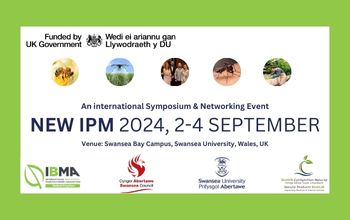
Jointly organised by IBMA, UK and Swansea University’s Natural Products BioHUB, the New IPM Symposium attracted over 200 delegates from around the world to encourage innovation in the IPM field.
This year's IPM Symposium attracted over 200 delegates from across the globe, bringing together academics, industry leaders and government officials for 3 days of innovation and networking to help propel the future of IPM research. On behalf of the organisation committee - Dr Farooq Shah, Professor Tariq Butt, Dr Ian Baxter and Dr Peter McEwen - and joint organisers, IBMA UK and the Natural Products BioHUB, we would like to offer our heartfelt thanks to everyone who attended this year's event.
Here's a quick rundown of the event...
Day 1: September 2nd 2024
On the first official day of the IPM Symposium, we welcomed delegates from all over the world including China, Brazil, USA, Pakistan, Oman, Morrocco and Russia. Professor Tariq Butt (Swansea University) and Dr Ian Baxter (IBMA, UK) opened our first session where we heard talks on plant disease management, natures biodiversity for eco-sustainability, the role of semiochemicals and sentinel crop disease surveillance. The following session chaired by Dr Peter McEwen (PKMC) discussed the issue of vectors and nuisance pests, where speakers presented solutions on repelling pests such as bed bugs, mosquitos and larvae. After a lunch break, delegates returned for the final two sessions of the day, semiochemicals chaired by Dr Mary Ellis (PheroSyn), and tree health chaired by Richard Hunter (Confor), where subjects included; pheromones, fruit flies, weevils and forest nurseries. At the end of the conference, delegates were invited to network over a BBQ, hosted on the Swansea University Bay Campus.
Session topics:
- Vectors & Nuisance Pests
- Semiochemicals
- Tree Health
Day 2: September 3rd 2024
The second day of the conference started with a session on bee health and entomovectoring, chaired by Dr Erica Shelley (Best for Bees), where speakers discussed threats to bees, protective equipment for hive health and the enhancement of pollination. The session was followed by a short break before delegates returned for dual sessions on microbial biopesticides, chaired by Dr Steve Edgington (CABI) and AI and sensor applications, chaired by Dr Ginu Rajan (Cardiff Metropolitan University). During the microbial biopesticides sessions, speakers gave presentations on aphid control, integrated berry production and pest control planning, while the AI session discussed sensor solutions for soil biodiversity, plant electrophysiology and precision orchard management. After a refreshment break, delegates were encouraged to attend a poster session, highlighting the works of international academics.
At 6.30pm, delegates returned for our annual gala dinner where they networked with other delegates and listened to a few short speeches from the organisers, IBMA UK and the Natural Products BioHUB. The dinner was accompanied by a local harpist and 6 awards were presented to attendees for recognition of their work in IPM development.
Session topics:
-
Bee Health and Entomovectoring
-
Microbial Biopesticides
-
AI and Sensor Applications
Gala Dinner Winners:
- Lifetime achievement recognition award - Professor Owen Jones
- In recognition of the outstanding contribution to sustainable forestry - David Edwards
- In recognition of the outstanding contribution to sustainable agriculture - Dr Willem Ravensberg
- In recognition of the outstanding contribution to communications relevant for Integrated Pest Management - Ras Patel
- In recognition of the outstanding contribution of providing innovative IPM solutions for growers around the world - Dr Shakir Al Zaidi
- In recognition of excellence and innovation in the field of precision biocontrol - Professor Peter Kevan
Day 3: September 4th 2024
The final day consisted of four sessions; IPM challenges - chaired by Belinda Luke (CABI), multi-functional microbes - chaired by Dr Caroline Reid (IBMA, UK), regulatory challenges - chaired by Dr Ian Baxter (IBMA, UK) and the investment & commercialisation landscape - chaired by Mark John (Tramshed Tech). Speakers offered insights into topics including; pesticide resistance, entomopathogenic fungi, the need for biopesticide reform and potential funding opportunities for businesses. The final session, chaired by Mark John, closed with a panel discussion between representatives from Innovate UK, Swansea Council, PwC, BID/Invest, Development Bank of Wales, Barclays Eagle Labs and the Royal Academy of Engineering.
Session topics:
-
IPM Challenges
-
Multi-functional Microbes
-
Regulatory Challenges
-
Investment & the Commercialisation Landscape
Our Sponsors:
We would like to thank our sponsors, whose contribution made this event a resounding success!
- MGK
- Razbio
- Koppert
- Penderyn
